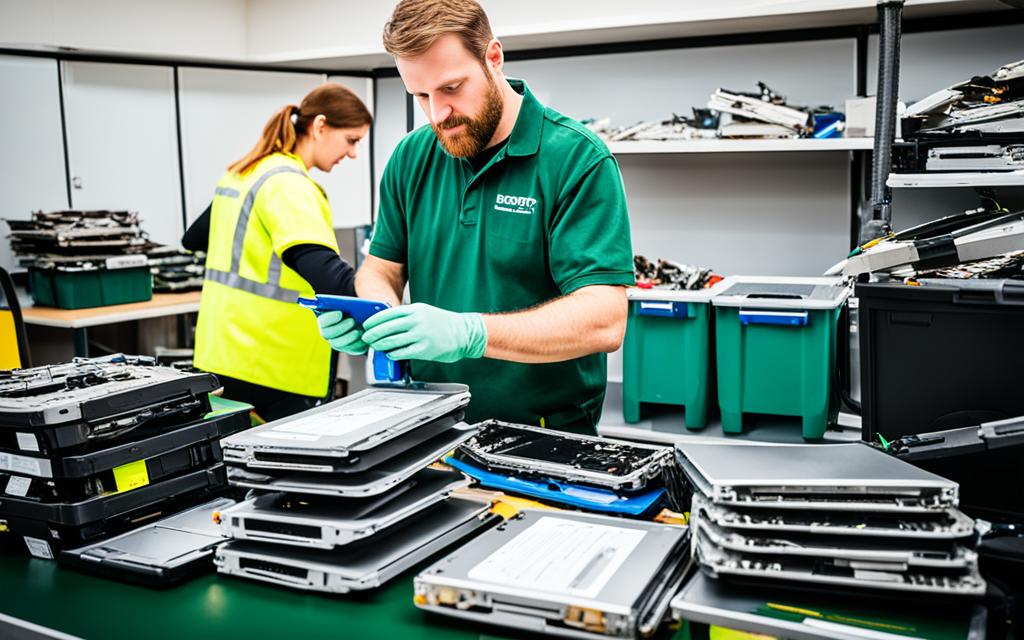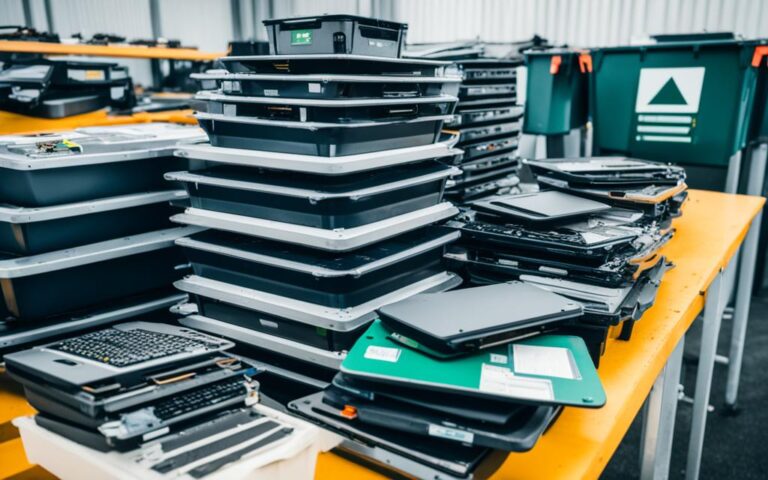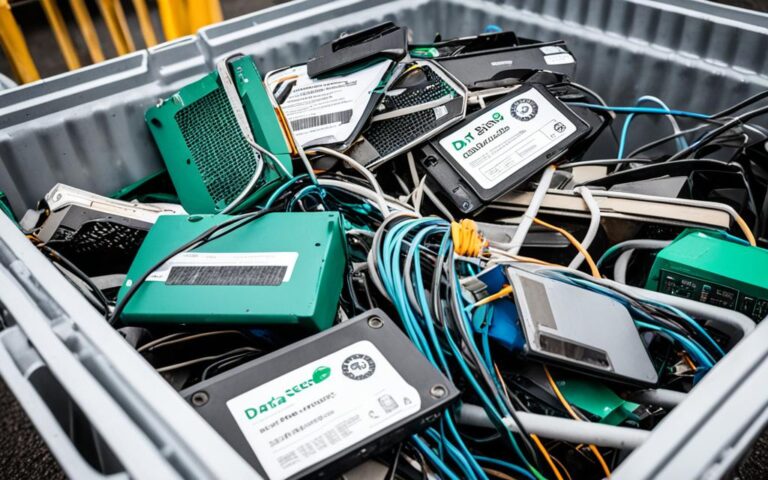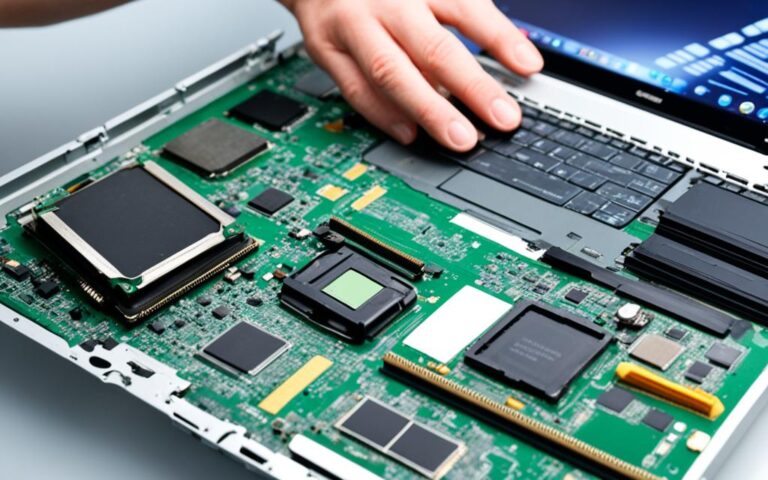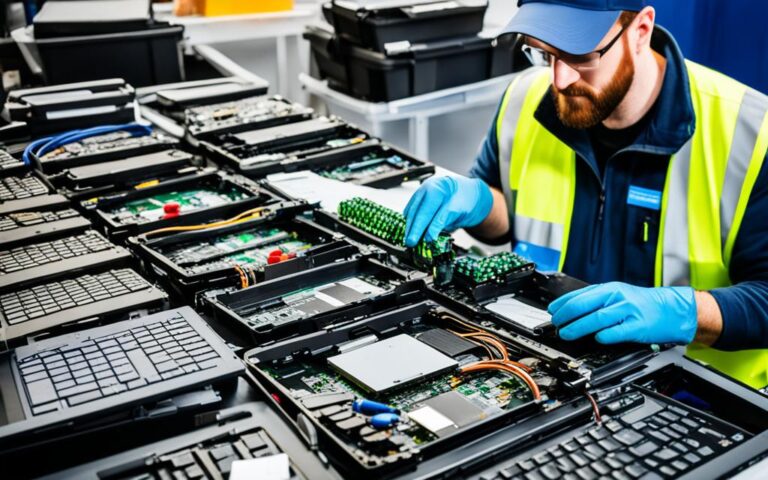The Ethics of Laptop Recycling: Ensuring Fair Practices
Welcome to our comprehensive guide on the ethics of laptop recycling. In today’s digital era, responsible e-waste management and ethical IT asset disposal are crucial for businesses. Upgrading IT equipment is a common practice, but the disposal process plays a vital role in preventing environmental degradation and promoting sustainable practices.
In this guide, we will explore the importance of fair laptop recycling practices, the impact of e-waste on the environment and health, and the benefits of ethical IT asset disposal. By understanding these key aspects, businesses can contribute to a circular economy and create a positive impact on society and the environment.
By implementing fair laptop recycling practices, businesses can ensure the responsible handling and disposal of electronic devices. This not only reduces the carbon footprint and minimizes landfill pollution but also mitigates the social risks associated with unethical recycling practices such as child labor.
Furthermore, ethical IT asset disposal prioritizes data security, protecting sensitive information and preventing data breaches that could lead to reputational damage and legal consequences. By securely erasing or destroying data on decommissioned devices, businesses can maintain customer trust and comply with data protection laws.
In the following sections, we will examine the environmental impact of improper laptop disposal, the social consequences of unethical recycling, the regulatory frameworks governing laptop recycling, and the best practices for responsible IT asset disposal. By exploring these topics, we aim to provide valuable insights and actionable guidance for businesses seeking to adopt fair and ethical laptop recycling practices.
The Environmental Impact of Improper Laptop Disposal
Improper disposal of laptops and other electronic devices contributes to e-waste, which poses a significant risk to the environment. E-waste contains toxic substances such as lead, mercury, and chemicals that can contaminate soil and water if not handled correctly. Landfills filled with e-waste contribute to pollution and endanger public health. Additionally, the production and disposal of laptops contribute to carbon emissions, further impacting climate change.
The Risks of E-Waste
E-waste, including laptops, contains hazardous materials that can have severe consequences on the environment and human health. Toxic substances like lead and mercury can leak into the soil, contaminating groundwater, and entering the food chain. This pollution can cause long-term damage to ecosystems, endangering fragile ecosystems and wildlife.
The improper disposal of laptops in landfills exacerbates the problem. When e-waste is left to decompose in poorly managed landfills, toxic substances can leach into the surrounding soil and water sources. This chemical contamination can persist for years, affecting plant and animal life and threatening the health of nearby communities.
A 2019 report by the United Nations University estimated that electronic waste, including laptops, reached 53.6 million metric tonnes, with only 17.4% of it properly recycled. This highlights the urgent need for responsible laptop disposal to mitigate the environmental and health risks associated with e-waste.
Carbon Footprint of Laptop Production and Disposal
The production and disposal of laptops also contribute to carbon emissions, further exacerbating climate change. The manufacturing process of laptops requires significant amounts of energy and resources, resulting in substantial carbon emissions. From mining raw materials to manufacturing components and assembling the final product, each stage has an environmental impact.
According to a study published in the Journal of Industrial Ecology, the production of a laptop results in emissions of approximately 350 kg of CO2. This carbon footprint increases when considering the disposal phase. When laptops are discarded in landfills instead of being recycled or reused, they contribute to methane emissions, a potent greenhouse gas that accelerates global warming.
An effective method to reduce laptops’ carbon footprint is through refurbishment and reuse. By extending the lifespan of laptops through refurbishment and encouraging their reuse, we can reduce the need for new production and minimize the associated carbon emissions.
The Importance of Responsible Laptop Disposal
“Proper laptop disposal is crucial for safeguarding the environment, public health, and combating climate change. The irresponsible handling of e-waste not only contributes to environmental degradation but also perpetuates a cycle of resource extraction, pollution, and health risks. It is our responsibility to adopt sustainable practices and prioritize responsible laptop disposal to minimize the adverse impact on our planet.”
Responsible laptop disposal is essential for mitigating the environmental impact of e-waste. By adopting proper recycling practices, we can recover valuable materials from discarded laptops while minimizing the release of toxic substances into the environment.
Recycling programs and specialized e-waste facilities play a vital role in the safe and environmentally friendly disposal of laptops. These facilities employ techniques to extract valuable metals and components, reducing the need for new mining and manufacturing processes.
Furthermore, choosing laptops with longer lifespans and eco-friendly designs can reduce the overall carbon footprint associated with laptop production and disposal. Embracing energy-efficient technologies, using recyclable materials, and prioritizing repairability and upgradability are steps towards more sustainable laptop consumption.
| Toxic Substances in E-Waste | Environmental Impact | Carbon Footprint |
|---|---|---|
| Lead | Contaminates soil and water | Contributes to climate change |
| Mercury | Endangers ecosystems and wildlife | Increases greenhouse gas emissions |
| Chemicals | Threatens human health | Accelerates global warming |
The Social Impact of Unethical Laptop Recycling
Unethically disposed e-waste often finds its way into the informal recycling sector, where child labor is prevalent. The presence of child labor in this sector poses significant ethical concerns and has severe social implications. Children working in these industries are exposed to toxic substances, endangering their health and impeding their growth and development.
The informal recycling sector operates outside the bounds of established regulations, leading to exploitative practices and unsafe working conditions. The lack of proper protective measures puts these children at risk of long-term health problems, including respiratory issues, organ damage, and developmental abnormalities.
Organizations that engage in unethical laptop recycling practices not only contribute to the exploitation of vulnerable populations but also face potential reputational damage and legal consequences. Consumer sentiment has shifted towards supporting businesses with responsible practices, and companies that fail to adopt ethical recycling methods risk tarnishing their brand image and losing the trust of their customers.
“Promoting fair laptop recycling practices not only mitigates the social impact of child labor but also creates opportunities for positive change within the industry.”
By implementing fair laptop recycling practices, businesses can actively contribute to responsible e-waste management and initiate positive social impact. Engaging stakeholders and raising awareness about the environmental and social risks associated with unethical practices can encourage the adoption of more sustainable approaches.
The Importance of Responsible E-Waste Management
Responsible e-waste management involves complying with regulations, supporting the formal recycling sector, and establishing robust systems for the proper disposal and recycling of electronic devices. By prioritizing ethical laptop recycling, businesses can uphold their corporate social responsibility, protect the welfare of vulnerable communities, and safeguard the environment from the damaging effects of e-waste.
| Impact of Unethical Laptop Recycling | Possible Solutions |
|---|---|
| Child labor in informal recycling sector | Promote fair laptop recycling practices |
| Adverse health effects on children | Advocate for safe working conditions and protective measures |
| Reputational damage for businesses | Adopt ethical recycling methods and communicate responsible practices |
| Potential legal repercussions | Comply with e-waste disposal regulations |
By integrating ethical practices into their operations, businesses can ensure their positive impact reaches beyond profit generation, creating a sustainable future for all.
The Importance of Data Security in Laptop Disposal
Improper disposal of laptops can result in data breaches, leading to financial losses and reputational damage for businesses. Sensitive information stored on decommissioned devices must be securely erased or destroyed to prevent unauthorized access. Data protection laws, such as the recently ratified Digital Personal Data Protection Act in the United Kingdom, specify penalties for failure to secure data during disposal. Employing ethical disposal practices, including secure data destruction methods, ensures the protection of confidential information and maintains customer trust.
“Secure data disposal is paramount in the laptop recycling process. Businesses must take stringent measures to prevent data breaches that can have severe legal consequences.”
According to recent statistics, data breaches have become increasingly common, with the number of incidents rising by 36% in 2020 alone. The repercussions of a data breach can be devastating, including financial losses from compensation claims, regulatory fines, and the impact on customer trust. Proper laptop disposal must address the data security aspect to mitigate and eliminate these potential risks.
Protecting Sensitive Information
Businesses handle a vast amount of sensitive information, including financial records, customer data, intellectual property, and trade secrets. When laptops reach the end of their lifecycle, it is crucial to employ data destruction methods that ensure sensitive information cannot be accessed, recovered, or misused.
Commonly used methods for secure data disposal include overwriting data with random characters, physical destruction, and degaussing, a process that removes data by altering the magnetic field of the storage medium. These methods effectively erase the data, making it extremely difficult, if not impossible, to recover.
The Legal Consequences
Failure to comply with data protection laws during laptop disposal can result in serious legal consequences for businesses. The recently ratified Digital Personal Data Protection Act in the United Kingdom imposes strict penalties for improper handling of sensitive information. Organizations found guilty of non-compliance can face hefty fines, legal action, and reputational damage.
In addition, businesses may also be subject to other regulations such as the General Data Protection Regulation (GDPR) for the European Union and the California Consumer Privacy Act (CCPA) for companies operating or processing personal data in those regions. It is crucial for businesses to understand and adhere to these regulations to avoid legal consequences.
The Trust Factor
Reputational damage resulting from a data breach can have long-term consequences for a business. Customers value their privacy and expect their data to be handled responsibly. A breach can erode trust, leading to customer defection, negative reviews, and a damaged brand image.
By prioritizing secure data disposal practices, businesses can demonstrate their commitment to protecting customers’ sensitive information, fostering trust and loyalty. Maintaining a strong data security framework throughout the laptop disposal process enhances the organization’s reputation and upholds its position as a responsible custodian of data.
Regulatory Framework for Laptop Recycling
Governments around the world have implemented e-waste management rules and guidelines to address the growing concern of electronic waste. Among them, India has established the e-waste (Management) Rules, which outline responsibilities for manufacturers, producers, and users, and introduce the concept of Extended Producer Responsibility (EPR).
Extended Producer Responsibility (EPR) is a fundamental principle of the e-waste management rules that shifts the responsibility of disposal onto manufacturers. This encourages manufacturers to design products with recyclability in mind, ensuring their participation in the entire lifecycle of their products.
Compliance with these disposal regulations is essential to contribute to responsible laptop recycling. Failing to comply with the e-waste management rules can lead to legal penalties and fines. Businesses must adhere to these regulations and actively participate in proper e-waste disposal to mitigate environmental and health risks.
The e-waste (Management) Rules in India
“The government of India, through the Ministry of Environment, Forest and Climate Change, introduced the e-waste (Management) Rules to regulate the generation, collection, treatment, storage, and disposal of electronic waste. These rules lay the foundation for responsible laptop recycling and underscore the importance of extended producer responsibility.”
Under the e-waste (Management) Rules, manufacturers are required to collect and channelize electronic waste generated from their products to authorized recyclers. They must also submit regular reports on the collection and disposal of electronic waste to demonstrate compliance with EPR obligations.
Additionally, the guidelines specify procedures for safe and environmentally sound recycling, treatment, and disposal of e-waste. These include measures to prevent pollution, handle hazardous substances, and promote resource conservation.
By adhering to these regulations, businesses can contribute to sustainable e-waste management and mitigate the negative impacts of improper laptop disposal.
| Key Components of the e-waste (Management) Rules | Responsibilities |
|---|---|
| Extended Producer Responsibility (EPR) | Manufacturers are responsible for the collection and disposal of electronic waste generated from their products. |
| Authorized Recyclers | Manufacturers must collaborate with authorized recyclers for the proper treatment and disposal of e-waste. |
| Reporting | Manufacturers must submit regular reports on the collection and disposal of e-waste to demonstrate compliance with EPR obligations. |
| Safe and Environmentally Sound Recycling | Guidelines are provided for the safe handling, recycling, and disposal of e-waste to prevent pollution and protect human health. |
Ensuring compliance with the e-waste (Management) Rules is not only a legal requirement but also a moral obligation to protect the environment and promote sustainable practices. By embracing responsible laptop recycling, businesses can demonstrate their commitment to environmental stewardship, reduce their carbon footprint, and contribute to a circular economy.
The Carbon Footprint of Laptop Production and Disposal
The production and disposal of laptops contribute to carbon emissions throughout their lifecycle. Manufacturing laptops is resource-intensive, and the carbon footprint is primarily associated with the production stage. However, higher-quality laptops with longer lifespans can offset their manufacturing footprint. Refurbishing, reusing, and buying second-hand laptops are more sustainable options. The IT sector’s overall carbon impact is difficult to quantify, but technological progress in IT can lead to efficiency savings and potential reductions in carbon footprint if demand is controlled.
Resource-Intensive Manufacturing Process
Manufacturing laptops involves a significant consumption of resources, including materials and energy. These processes contribute to the carbon emissions and the overall environmental impact of laptop production. With a growing demand for laptops, it becomes essential to consider more sustainable alternatives.
Longer Lifespan and Durability
Higher-quality laptops that have longer lifespans can offset their manufacturing footprint by reducing the need for frequent replacement. Investing in durable laptops that can withstand hardware and software advancements over an extended period can contribute to sustainability and reduce carbon emissions associated with production.
“Choosing laptops that have a longer lifespan and maintaining them properly can help in minimizing the environmental impact of laptop production and disposal.” – Laptop Guru Magazine
Sustainable Alternatives: Refurbishing and Reusing
Refurbishing and reusing laptops are effective ways to reduce the carbon footprint of laptop production and disposal. By extending the lifespan of laptops through refurbishment, fewer new laptops are produced, lessening the environmental impact. Additionally, organizations and individuals can consider buying second-hand laptops, contributing to a circular economy and reducing resource extraction and manufacturing emissions.
Efficiency Savings and Demand Control
Technological advancements and improvements in energy efficiency can lead to significant efficiency savings in the IT sector. By optimizing processes, reducing energy consumption, and implementing sustainable practices, the carbon footprint of laptop production and disposal can be further reduced. However, controlling the demand for laptops is crucial to ensure the efficiency savings translate into actual reductions in carbon emissions.
By considering the environmental impact of laptop production and disposal, individuals and organizations can make informed choices to minimize their carbon footprint. Choosing sustainable options such as longer-lasting laptops, refurbishment, and reusing can contribute to a more eco-friendly IT industry.
Responsible IT Asset Disposal Best Practices
Responsible IT Asset Disposal encompasses a comprehensive process that involves careful planning for asset retirement, secure data removal, regulatory compliance, meticulous documentation, and safe transportation. Prioritizing data security and adhering to regulations are crucial aspects of this process, as well as focusing on value recovery through the resale or reuse of assets. Training employees and establishing a culture of accountability within the organization play pivotal roles in ensuring successful IT asset disposal.
Partnering with trustworthy and environmentally friendly disposal services is vital to achieve responsible asset disposal. By prioritizing safe transportation and maintaining thorough documentation, businesses can guarantee compliance with regulations and maximize the positive impact of their disposal practices.
Secure Data Removal
One of the key concerns in IT asset disposal is ensuring the secure removal of sensitive data stored on retired devices. Failing to properly remove data from laptops poses a significant risk of data breaches, leading to severe consequences such as financial losses and reputational damage. By employing reliable data destruction methods, businesses can mitigate the risk of unauthorized access and maintain the confidentiality of sensitive information.
Value Recovery through Resale or Reuse
Responsible IT asset disposal involves not only disposing of devices but also exploring opportunities for value recovery. Rather than simply discarding decommissioned laptops, businesses can consider reselling or reusing them. This approach not only helps recover some of the investment but also contributes to sustainability efforts by extending the lifespan of devices and reducing electronic waste.
“By prioritizing data security, adhering to regulations, and recovering value from assets, businesses can ensure responsible IT asset disposal.”
Compliance and Accountability
Adhering to regulations related to IT asset disposal is essential to avoid legal penalties and maintain a positive reputation. Organizations need to stay up to date with relevant laws and guidelines to ensure compliance throughout the disposal process. Additionally, fostering a culture of accountability within the organization helps to ensure that employees understand the importance of responsible asset disposal and actively participate in its implementation.
Implementing the best practices mentioned above requires collaboration with disposal service providers who prioritize both regulatory compliance and environmental sustainability. By choosing reputable partners, businesses can enhance their commitment to responsible IT asset disposal and contribute to a circular economy.
| Step | Description |
|---|---|
| 1 | Asset Retirement Planning |
| 2 | Secure Data Removal |
| 3 | Regulatory Compliance |
| 4 | Thorough Documentation |
| 5 | Safe Transportation |
| 6 | Value Recovery through Resale or Reuse |
| 7 | Employee Training |
| 8 | Culture of Accountability |
Conclusion
Fair laptop recycling practices and ethical IT asset disposal are essential for promoting environmental stewardship, reducing the carbon footprint, and safeguarding data security. By adhering to regulatory frameworks and embracing sustainable practices, organizations can demonstrate their commitment to responsible e-waste management and sustainability.
Implementing ethical IT asset disposal not only benefits the environment but also enhances brand reputation and attracts environmentally conscious stakeholders. Prioritizing fair laptop recycling practices is crucial for businesses to contribute to a circular economy and create a positive impact on society and the environment.
It is time for businesses to step up and prioritize fair laptop recycling practices, ensuring ethical IT asset disposal. By doing so, they not only protect the environment but also establish themselves as responsible corporate citizens who value environmental stewardship and data security.
FAQ
What are fair laptop recycling practices?
Fair laptop recycling practices involve the responsible and ethical disposal of laptops to prevent environmental degradation and contribute to sustainable practices. This includes recycling laptops through certified recycling centers or refurbishing and reusing them whenever possible. It also entails securely erasing or destroying sensitive data to protect privacy and prevent data breaches.
What is the impact of e-waste on the environment?
Improper disposal of laptops and other electronic devices as e-waste poses a significant risk to the environment. E-waste contains toxic substances such as lead, mercury, and chemicals that can contaminate soil and water if not handled correctly. Landfills filled with e-waste contribute to pollution and endanger public health. The production and disposal of laptops also contribute to carbon emissions, further impacting climate change.
How does unethical laptop recycling affect society?
Unethically disposed e-waste often ends up in the informal recycling sector, where child labor is prevalent. Children working in these industries are exposed to toxic substances, leading to adverse health effects and hindering their growth and development. Organizations that engage in unethical laptop recycling practices risk reputational damage and potential legal repercussions. Promoting fair laptop recycling practices can create opportunities for positive social impact and engage stakeholders in responsible e-waste management.
Why is data security important in laptop disposal?
Improper disposal of laptops can result in data breaches, leading to financial losses and reputational damage for businesses. Sensitive information stored on decommissioned devices must be securely erased or destroyed to prevent unauthorized access. Data protection laws specify penalties for failure to secure data during disposal. Employing ethical disposal practices, including secure data destruction methods, ensures the protection of confidential information and maintains customer trust.
What are the regulations for laptop recycling?
Governments across the world have implemented regulations and guidelines for laptop recycling and e-waste management. For example, in India, the e-waste (Management) Rules outline responsibilities for manufacturers, producers, and users and establish the concept of Extended Producer Responsibility (EPR). Non-compliance with disposal regulations can result in legal penalties and fines. It is crucial for businesses to adhere to these rules and contribute to responsible laptop recycling.
What is the carbon footprint of laptop production and disposal?
The production and disposal of laptops contribute to carbon emissions throughout their lifecycle. Manufacturing laptops is resource-intensive, and the carbon footprint is primarily associated with the production stage. However, higher-quality laptops with longer lifespans can offset their manufacturing footprint. Refurbishing, reusing, and buying second-hand laptops are more sustainable options. Technological progress in IT can also lead to efficiency savings and potential reductions in carbon footprint if demand is controlled.
What are the best practices for responsible IT asset disposal?
Responsible IT asset disposal involves a comprehensive process that includes planning for asset retirement, secure data removal, regulatory compliance, documentation, and safe transportation. It is important to prioritize data security, adhere to regulations, and recover value from assets through resale or reuse. Training employees and establishing a culture of accountability are crucial for successful IT asset disposal. Businesses should partner with trustworthy and environmentally friendly disposal services, prioritize safe transportation, and maintain thorough documentation to ensure compliance and maximize the positive impact of responsible asset disposal.
Why is fair laptop recycling important?
Fair laptop recycling practices and ethical IT asset disposal are vital for promoting environmental stewardship, reducing the carbon footprint, and safeguarding data security. By adhering to regulatory frameworks, embracing sustainable practices, and prioritizing value recovery, organizations can demonstrate their commitment to responsible e-waste management and sustainability. Implementing ethical IT asset disposal not only benefits the environment but also enhances brand reputation and attracts environmentally conscious stakeholders. It is crucial for businesses to prioritize fair laptop recycling practices to contribute to a circular economy and create a positive impact on society and the environment.

